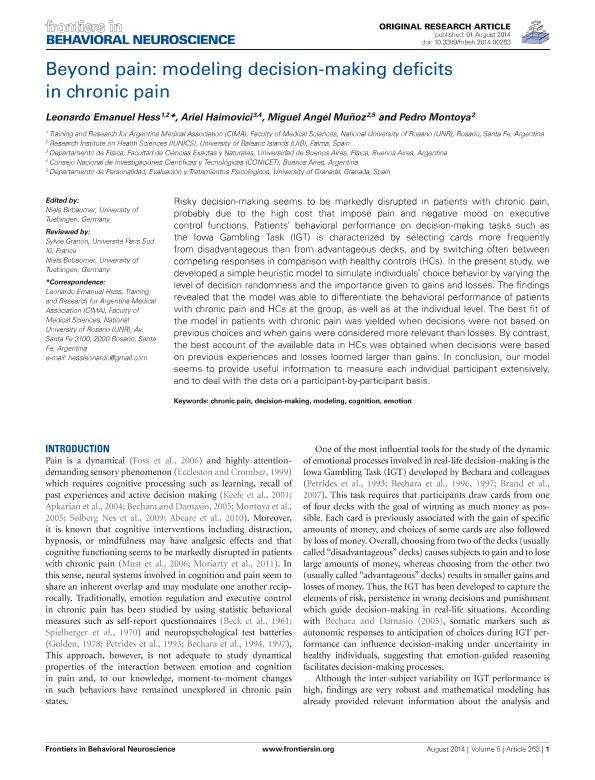Artículo
Beyond pain: Modeling decision-making deficits in chronic pain
Fecha de publicación:
08/2014
Editorial:
Frontiers Research Foundation
Revista:
Frontiers in Behavioral Neuroscience
ISSN:
1662-5153
Idioma:
Inglés
Tipo de recurso:
Artículo publicado
Clasificación temática:
Resumen
Risky decision-making seems to be markedly disrupted in patients with chronic pain, probably due to the high cost that impose pain and negative mood on executive control functions. Patients' behavioral performance on decision-making tasks such as the Iowa Gambling Task (IGT) is characterized by selecting cards more frequently from disadvantageous than from advantageous decks, and by switching often between competing responses in comparison with healthy controls (HCs). In the present study, we developed a simple heuristic model to simulate individuals' choice behavior by varying the level of decision randomness and the importance given to gains and losses. The findings revealed that the model was able to differentiate the behavioral performance of patients with chronic pain and HCs at the group, as well as at the individual level. The best fit of the model in patients with chronic pain was yielded when decisions were not based on previous choices and when gains were considered more relevant than losses. By contrast, the best account of the available data in HCs was obtained when decisions were based on previous experiences and losses loomed larger than gains. In conclusion, our model seems to provide useful information to measure each individual participant extensively, and to deal with the data on a participant-by-participant basis.
Palabras clave:
CHRONIC PAIN
,
COGNITION
,
DECISION-MAKING
,
EMOTION
,
MODELING
Archivos asociados
Licencia
Identificadores
Colecciones
Articulos(OCA CIUDAD UNIVERSITARIA)
Articulos de OFICINA DE COORDINACION ADMINISTRATIVA CIUDAD UNIVERSITARIA
Articulos de OFICINA DE COORDINACION ADMINISTRATIVA CIUDAD UNIVERSITARIA
Citación
Hess, Leonardo Emanuel; Haimovici, Ariel; Muñoz, Miguel Angel ; Montoya, Pedro; Beyond pain: Modeling decision-making deficits in chronic pain; Frontiers Research Foundation; Frontiers in Behavioral Neuroscience; 8; AUG; 8-2014; 1-8
Compartir
Altmétricas




